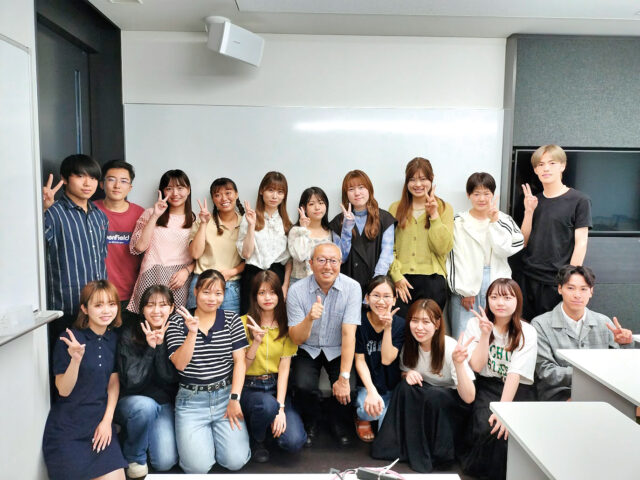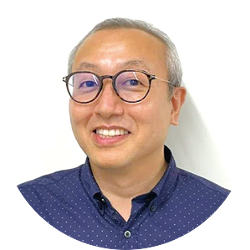When he was in high school, Professor Miyagi worried about how to make the world more peaceful, and decided to study economics at university, believing that the shortcut would be to eliminate poverty first. Although he studied the basics of theoretical economics in graduate school, his desire to put it into practice led him to join a policy study group attended by politicians and others. This led him to become the representative of an international NGO, and since then he has worked hard to tackle environmental issues and support developing countries. As a university teacher, he initially taught classes in economics and business administration, but later, his experience with NGOs led him to teach classes on collaborative activities between universities, local communities, and businesses. While working as a management consultant, he joined the newly established Kyoto Sangyo University Faculty of Contemporary Sociology in 2017. Drawing on his career, his seminars on the themes of ``place design'' and ``social innovation'' have become popular. We talked about international contributions, local contributions, and solving everyday problems through the lens of "smiles, consideration, and comfort," as well as his message to high school students.

Keywords: smile, consideration, comfort
It is believed that when people gather together, it becomes a "place," and their inner lives and actions influence each other, determining the state of the entire "place." ``Place'' means students' homes, schools, and part-time jobs, and working adults' homes, workplaces, and shops and public facilities. All people move between such "places", and it can be said that life is a series of such "places".
When we think of a ``place'' in this way, it is best if the ``place'' is bright and comfortable. Place design is about thinking about how to create such a place. I use three keywords, which you could call the key points, to use: ``smile,'' ``compassion,'' and ``comfort.''
Whether it's international contribution, regional contribution, community development, or even solving everyday problems at school or home, we need to understand what makes the people who live there and the people we study with feel comfortable, and how we can be there. My top priority is to make people smile. What is important is that consideration for others is essential as the basis for this.
If this point is neglected, plans and measures may be created that do not suit the actual situation in the field of community development. For example, a plan is to build a number of sophisticated and stylish cafes that are trending in Tokyo in a depopulated town. Even if you think about it for a moment, it is hard to imagine that this would make many of the residents smile. However, in reality, I think you have all seen such measures and the facilities created by them all over the place. It is unfortunate that many of them are subsidized, or taxed.
I don't want everyone's efforts to go to waste.
Students are also called upon to revitalize regions and cities. Community development involving young people, and revitalization of shopping districts based on young people's ideas. A project full of dreams like this is being carried out nationwide. One reason is that ministries and local governments that want new ideas are actively supporting these initiatives. All participating students work seriously with pure motivation. However, what if that actually doesn't bring a smile to anyone's face? I repeatedly remind people in classes and seminars to always ask themselves, ``Who is this project meant to make?'' and ``Who is it meant to make feel better?''
For social innovation
Another important aspect of various contribution activities is to listen to and feel what the target people want. To put it another way from an economics/management perspective, it is essential to ``understand the needs of the target'' through interviews, so-called marketing. This is commonplace in corporate activities, and in international NGO activities, which is my starting point, many measures have a direct connection to life and death, so it is an essential approach.
When doing so, it is essential to first have the attitude of discovering the attractiveness and good points of the target country or region. It's easy to focus on the negative aspects when we hear the words "problems" and "issues," but I think it's more fun and rewarding to look at the good points and create plans to further develop them.
Contribution activities are often planned and planned based on numerical values, such as economic and business indicators such as GDP, or the number of hospitals per unit area. However, there are limits to using only numerical values in a limited category as criteria for judgment. ``Comfort'' and ``For someone's smile'' may seem emotional and ambiguous expressions at first glance, but such feelings are valid criteria for judgment. That's what I think.
Another point is that people generally do not realize the value of the things around them, and often do not understand what is inconvenient about them. With this in mind, the most important things are the ability to imagine and imagine what should be, and the ability to discover problems. It is the power to manifest what is called "latent needs" in business administration. Treat your target audience with consideration and be proactive and envision plans and measures that will make them smile. These series of processes are the driving force behind social innovation.
Message to high school students
When you're young, and I was like that too, you often fall into the trap of thinking, ``Everything is decided here, and there's no going back.'' However, I entered the Faculty of Economics with the desire to eliminate poverty, and since then I have experienced a variety of careers, and currently teach at the Faculty of Contemporary Sociology. What people want to do changes over time, and it is natural for them to deviate here and there. Sometimes you may think that this is a long shot. However, when I look back as I get older, I can clearly see that all of those things have led me to where I am today. The important thing is to face whatever comes to mind at the time with all your might. They will definitely come to life when you discover what you really want to do and what you need to do.
4 years at the Faculty of Contemporary Sociology
A major feature of learning in the Faculty of Contemporary Sociology is that students are assigned to seminars from the fall semester of their second year, regardless of whether they are in the "Regional Areas," "Humanities," or "Media" courses. In my seminar, in the second year, students acquire the logic of problem discovery and problem solving, as well as basic knowledge and skills in management and facilitation, and learn about "place design and social innovation" through case studies. In the third year, students will work on several projects* of their own ideas. In the fourth year, students present their results as their graduation research.
*Project examples: (FY2019) Picture book project, (FY2023) Revitalization of Kurama "Jizoji", Design of learning place, etc.

Professor, Department of Contemporary Sociology, Kyoto Sangyo University
Professor Ippei Miyagi
After completing the doctoral program at Keio University's Faculty of Economics and Graduate School of Economics, he served as an associate professor at Hosei University's Graduate School of Policy Planning and a specially appointed professor at Hosei University's Center for Area Studies. In 2017, he became a professor at the Department of Contemporary Sociology, Kyoto Sangyo University. Since 1995, he has been active in international cooperation as a representative of the NPO GNC Japan. He is the auditor of the NPO Glocal Human Resource Development Center. He is a graduate of Toho High School.

